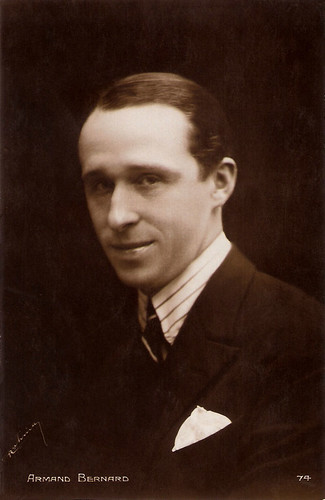
French postcard by Cinémagazine Edition, no. 74.
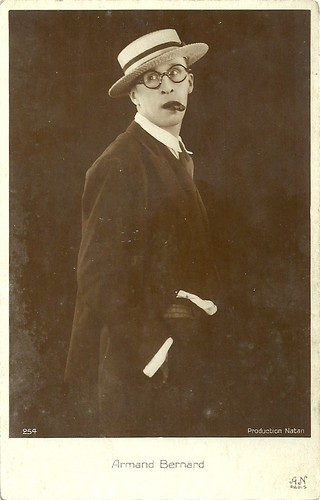
French postcard by A.N., Paris, no. 254. Photo: Production Natan.
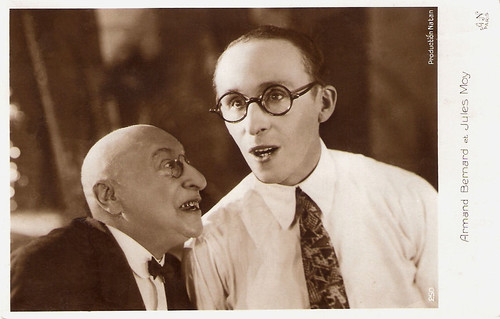
French postcard by A.N., Paris, no. 250. Photo: Production Natan. Publicity still for Rue de la paix (Henri Diamant-Berger, 1927) with Jules Moy.
The mundane snob
Armand Bernard was born in Bois-Colombes, France in 1893. The young Bernard dreamt of a career as an actor in stage tragedies, but his serious voice and his constant dignified appearance chose otherwise for him.
In various comic films, he played the mundane snob, the moron, the notary and even better the undertaker. His appearance often stole the show of other comedians as in the Fernandel comedies Les gueux au paradis/Hoboes in Paradise (René Le Henaff, 1946) and On demande un assassin/Assassin Wanted (Ernst Neubach, 1948).
Bernard was just as popular as the writer of film music for films such as Le million/The Million (René Clair, 1931) and Pension Mimosas/Pension Mimosa (Jacques Feyder, 1934) while he arranged the music for Sous les toits de Paris/Under the Roofs of Paris (René Clair, 1930). Bernard was also musical director for such films as Luis Bunuel’s L'âge d'or/The Golden Age (Luis Bunuel, 1930) and À nous la liberté (René Clair, 1931).
From 1914 on, Bernard had been highly active in silent cinema. He was Planchet, valet of D’Artagnan in the super-production Les trois mousquetaires/The Three Musketeers (Henri Diamant-Berger, 1921) and the sequel Vingts ans après/Five Years later (Henri Diamant-Berger, 1922). Bernard appeared in several films by Raymond Bernard, such as Le Petit Café/The Little Cafe (Raymond Bernard, 1919) with Max Linder, Le Miracle des loups/The Miracle of the Wolves (Raymond Bernard, 1924) with Charles Dullin, and Le Joueur des échecs/The Chess Player (Raymond Bernard, 1927) with Pierre Blanchar.
He also acted in films by André Hugon such as Le Diamant noir/The Black Diamond (André Hugon, 1922) and Les Deux Pigeons/The Two Pigeons (André Hugon, 1922), and he played the part of Jean-Jean in Abel Gance’s classic Napoléon (Abel Gance, 1927). After Diamant-Berger’s musketeer films, Bernard came back to him in the late 1920s for Éducation de prince/Education of a Prince (Henri Diamant-Berger, 1927) with Pierre Batcheff and Rue de la Paix (Henri Diamant-Berger, 1927) with Léon Mathot.
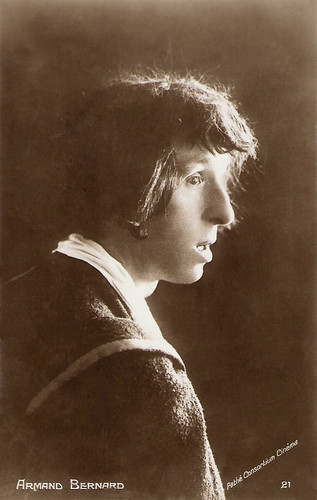
French postcard by Cinémagazine Edition, no. 21. Photo: Pathé Consortium Cinéma.

French postcard. Photo: Pathé. Publicity still for Vingt ans après/The Return of the Musketeers (Henri Diamant-Berger, 1922) with Béatrice Bretty as La belle hôtelière, Jean Yonnel as D'Artagnan, and Armand Bernard as Planchet.
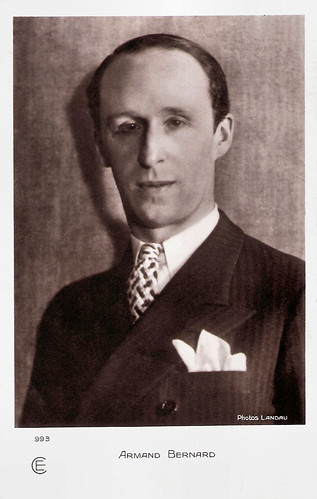
French postcard by Editions Cinémagazine, no. 993. Photo: Landau.
La Tirelire
Memorable early sound films with Armand Bernard are Fra Diavolo (Mario Bonnard, 1930) and Paris la nuit/Paris at Night (Henri Diamant-Berger, 1930).
Bernard also often played in the French version of Franco-German multilinguals of the 1930s: Tumultes/Tumults (Robert Siodmak, 1931) with Charles Boyer, Dactylo (Wilhelm Thiele, 1931) and Le congress s’amuse/The Congress Dances (Erik Charrell, 1931) with Lilian Harvey and Henri Garat.
Others were Quick (Robert Siodmak, 1931) with Jules Berry and Lilian Harvey, Caprice de princesse (Henri-Georges Clouzot, Karl Hartl, 1933) starring Marie Bell, and Les dieux s’amusent/The gods have fun (Reinhold Schunzel, Albert Valentin, 1935) starring Henri Garat.
Dactylo (Wilhelm Thiele, 1931), starring Marie Glory, was the French version of Thiele’s Die Privatsekretärin/The Private Secretary (Wilhelm Thiele, 1931), starring Renate Müller. An Italian version, La segretaria privata (Goffredo Alessandrini, 1931), starred Elsa Merlini.
All were successes and Dactylo had an equally popular sequel in France, Dactylo se marie/Dactylo Marries (Joe May, René Pujol, 1934), again starring Glory with Bernard as her sidekick. Bernard tried his luck with singing in Dactylo, even if his comic forte was more visual than oral, so he sang on a record two songs for the film - La tirelire (Boyer-Abraham) and Je vois la vie en rose (idem), French versions of Ich hab’ ne alte Tante and Ich bin ja heut’ so glücklich.
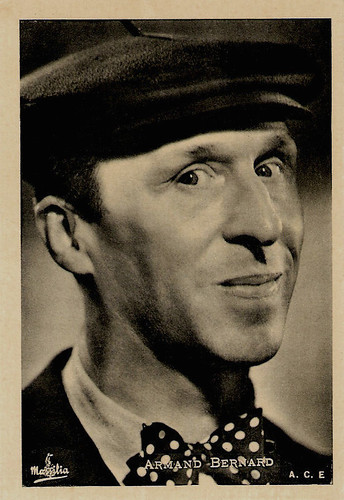
French card. Photo: Massilia/A.C.E.
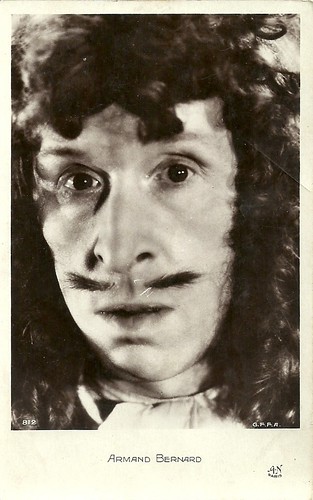
French postcard by A.N., Paris, no. 812. Photo: GFFA.
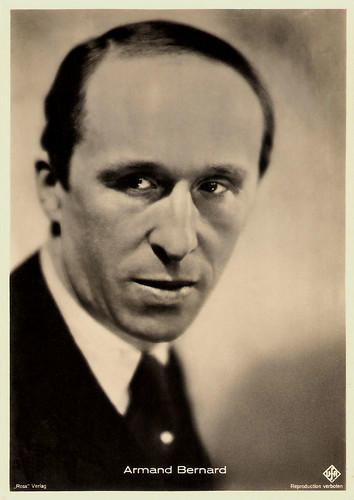
German postcard by Ross Verlag. Photo: Ufa.
Comedies of course
Armand Bernard also played in the French, English and Austrian version of Les aventures du roi Pausole/The Merry Monarch (Alexis Granowsky, 1933), which had Emil Jannings in the English and Austrian versions.
After new films with Diamant-Berger, Bernard also started to play in films by his younger brother Maurice Diamant-Berger (alias André Gillois) such as L’Enfant du miracle/The Miracle Child (D.B. Maurice, 1932).
From the mid-1930s on, Bernard played in several films by Christian-Jaque, such as Compartiment de dames seules/Compartment for ladies only (Christian-Jaque, 1936), L’école des journalistes/The School for Journalists (Christian-Jaque, 1936), the murder mystery Les Disparus de St. Agil/Boys' School (Christian-Jaque, 1937) and the Fernandel comedy Raphaël le Tatoué/Raphaël the tattooed (Christian-Jaque, 1938).
Other directors connected to Bernard in the 1930s were Pierre Caron and René Pujol. During the war Bernard did not act in films, retaking his film career in 1945 with – of course – comedies like Bichon (René Jayet, 1948) and L’impeccable Henri/Impeccable Henri (Charles-Félix Tavano, 1948), in which he had the lead.
Until the late 1950s, Bernard had a highly active film career, mostly in comedy, with titles like C’est la faute d’Adam/In Six Easy Lessons (Jacqueline Audry, 1948) with Dany Robin. His last film role was in La bande à Bobo/Bobo's Band (Tony Saytor, 1963) while he also acted in three French TV series in the early 1960s, such as Loin de Rueil (Claude Barma, 1961), after Raymond Queneau’s novel. Armand Bernard died in Paris in 1968. All in all, he had worked on some 100 films.

French postcard by EDUG, no. 1506. Photo: Tobis-Films. Armand Bernard in La femme en homme/The Woman Dressed As a Man (Augusto Genina, 1932).
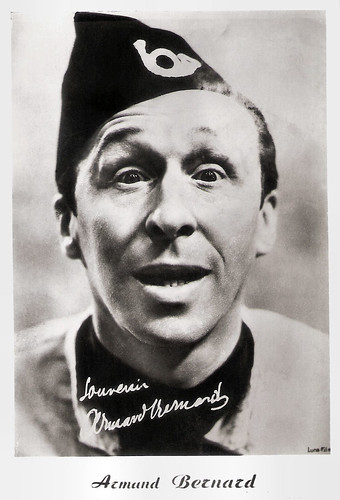
French postcard by Combier Imp., Macon. Photo: Luna-Film. Publicity still for La margoton du bataillon/The Mascot of the Batallion (Jacques Darmont, 1933).
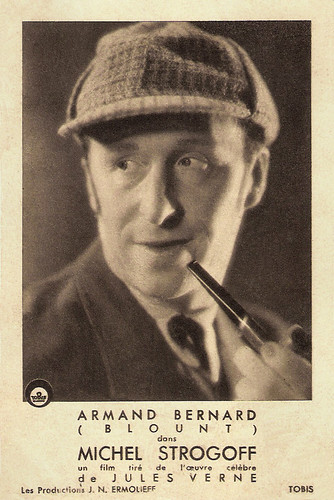
French postcard by Tobis. Photo: Les productions J.N. Ermolieff. Publicity still for Michel Strogoff (Jacques de Baroncelli, Richard Eichberg, 1936).
>
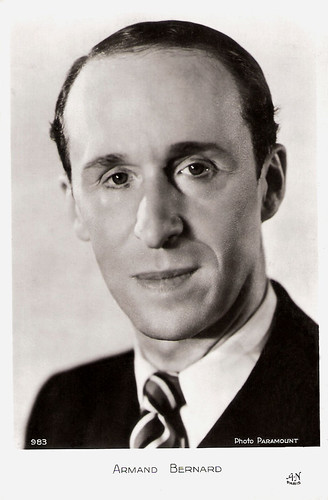
French postcard by A.N., Paris, no. 983. Photo: Paramount.
Sources: Du temps des cerises aux feuilles mortes (French - now defunct), Wikipedia (English and French), and IMDb.
This post was last updated on 16 May 2023.
1 comment:
Armand Bernard's filmography, actor.All r stylist photo.i like all.
Post a Comment